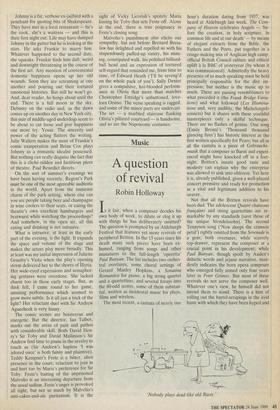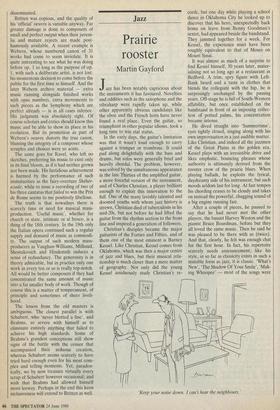Music
A question of revival
Robin Holloway
Is it fair, when a composer decides his own body of work, to dilute or clog it up with things he has deliberately omitted? The question is prompted by an Aldeburgh Festival that features yet more revivals of peripheral Britten. In the 13 years since his death many such pieces have been ex- humed, ranging from songs and other miniatures to the full-length 'operetta' Paul Bunyan. The list includes two orches- tral overtures, some choral settings of Gerard Manley Hopkins, a Sonatina Romantica for piano, a big string quartet and a quartettino; and several forays into the 80-odd scores, some of them substan- tial, written as incidental music for plays, films and wireless.
The most recent, a cantata of nearly one
hour's duration dating from 1937, was heard at Aldeburgh last week. The Com- pany of Heaven celebrates Angels — 'be- fore the creation, in holy scripture, in common life and at our death' — by means of elegant extracts from the Bible, the Fathers and the Poets, put together in a cringe-making mix of Anglican high camp, official British Council culture and ethical uplift a la BBC of yesteryear (by whom it was commissioned). Admittedly the heavy presence of so much speaking must be held principally responsible for the dire im- pression; but neither is the music up to much. There are passing resemblances to what preceded it (the Frank Bridge Varia- tions) and what followed (Les Illumina- tions and, very audibly, the Michelangelo sonnets) but it shares with these youthful masterpieces only a skilful technique. There are no flashes of genius. One song (Emily Bronte's 'Thousand thousand glancing fires') has historic interest as the first written specifically for Pears; but all in all the cantata is a piece of Gebrauchs-. musik that a composer so fluent and experi- enced might have knocked off in a fort- night. Britten's innate good taste and modesty can explain why the enterprise was allowed to sink into oblivion. Yet here it is, already published, given a well-placed concert premiere and ready for promotion as a vital and legitimate addition to his oeuvre.
Not that all the Britten revivals have been dud. The adolescent Quatre chansons francaises and string quartettino are re- markable by any standards (save those of the unique Mendelssohn). The second Tennyson song (Now sleeps the crimson petal') rightly omitted from the Serenade is a gem; both overtures, while scarcely top-drawer, represent the composer at a crucial point in his development; while Paul Bunyan, though spoilt by Auden's didactic words and jejune narrative, man- ifestly indicates the born opera composer who emerged fully armed only four years later in Peter Grimes. But most of these revivals do not serve the composer well. Whatever one's view, he himself did not intend them to stand. There is a hint of rolling out the barrel-scrapings in the avid haste with which they have been hyped and `Nobody plays dead like old Rusty.' disseminated.
Britten was copious, and the quality of his 'official' oeuvre is variable anyway. Far greater damage is done to composers of small and perfect output when their juveni- lia and mature rejects are made post- humously available. A recent example is Webern, whose numbered canon of 31 works had come to seem inviolate. It is quite interesting to see what he was doing before op. 1 so long as the purpose of op. 1, with such a deliberate artist, is not lost: his momentous decision to come before the public for the first time as himself. And the later Webern archive material — extra music running alongside finished works with opus numbers, extra movements to such pieces as the Symphony which are perfect already — is in all cases inferior. His judgment was absolutely right. Of course scholars and critics should know this music and be able to show its place in his evolution. But its promotion as part of Webern's oeuvre distorts the true canon, blunting the integrity of a composer whose scruples and choices were so acute.
The same goes for Ravel, who left no sketches, preferring his music to exist only in its final bloom, as if it had neither grown nor been made. His fastidious achievement is harmed by the performance of such immaturities as the fairy-overture Sheher- azade; while to issue a recording of two of his three cantatas that failed to win the Prix de Rome seems to me positively libellous.
The truth is that nowadays there is scarcely time or need for musical mass- production. 'Useful music', whether for church or state, intimate or al fresco, is a thing of the 18th century. In the 19th only the Italian opera continued such a regular supply and demand of music as commodi- ty. The output of such modern mass- producers as Vaughan-Williams, Milhaud, Shostakovich and Hindemith induces a sense of redundancy. The generosity is in theory admirable, but in practice only one work in every ten or so is really top-notch. All would be better composers if they had concentrated the same amount of music into a far smaller body of work. Though of course this is a matter of temperament, of principle and sometimes of sheer liveli- hood.
The lesson from the old masters is ambiguous. The closest parallel is with Schubert, who 'never blotted a line', and Brahms, so severe with himself as to eliminate entirely anything that failed to achieve his high standards. Some of Brahms's grandest conceptions still show signs of the battle with the censor that accompanied their arduous creation, whereas Schubert seems scarcely to have tried hard enough even for his most com- plex and telling moments. Yet, paradox- ically, we by now treasure virtually every scrap of Schubert however occasional; and wish that Brahms had allowed himself more leeway. Perhaps in the end this keen inclusiveness will extend to Britten as well.











































































 Previous page
Previous page